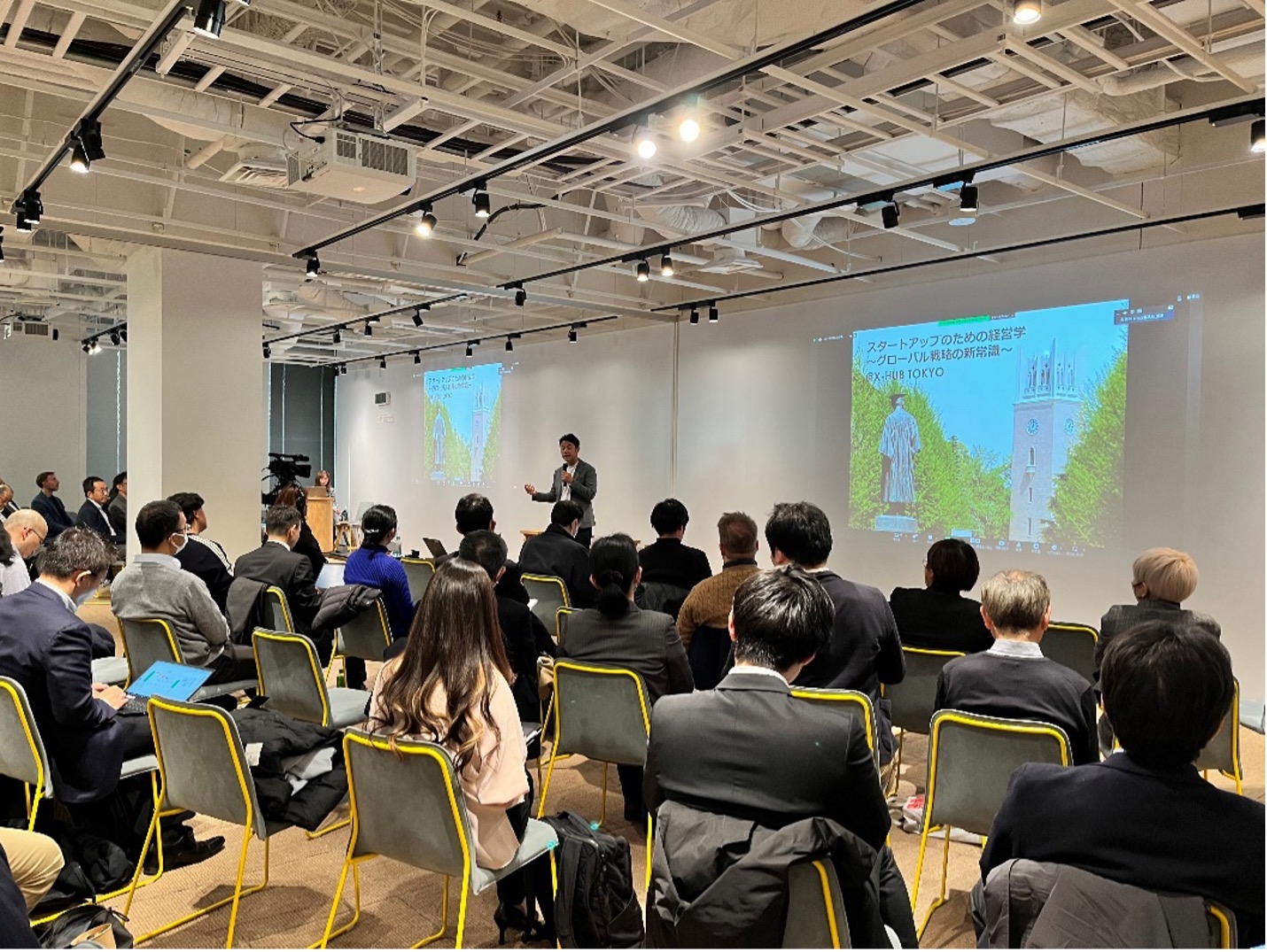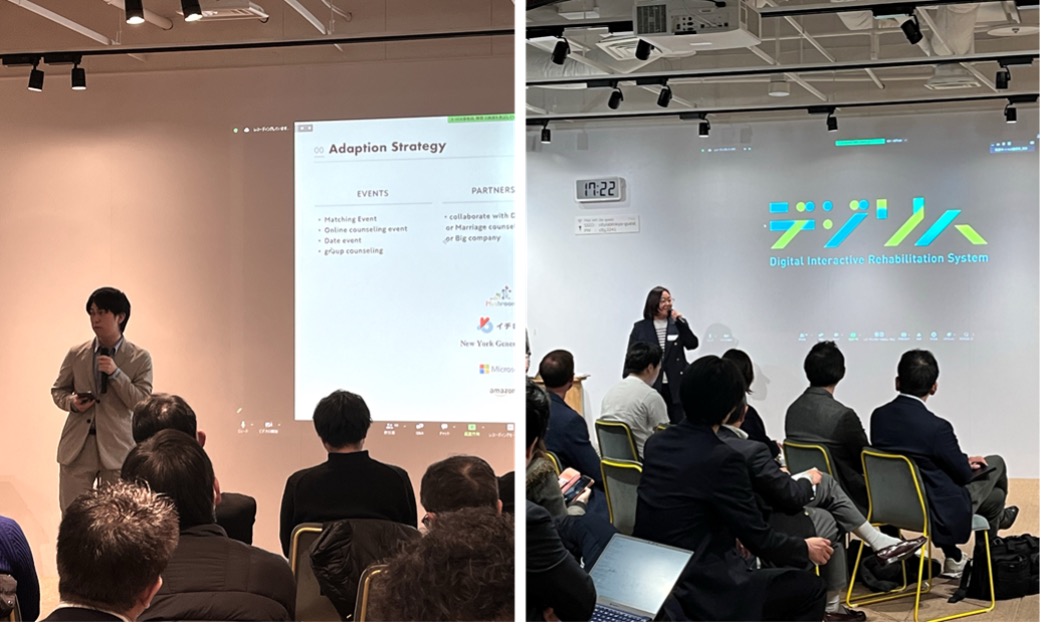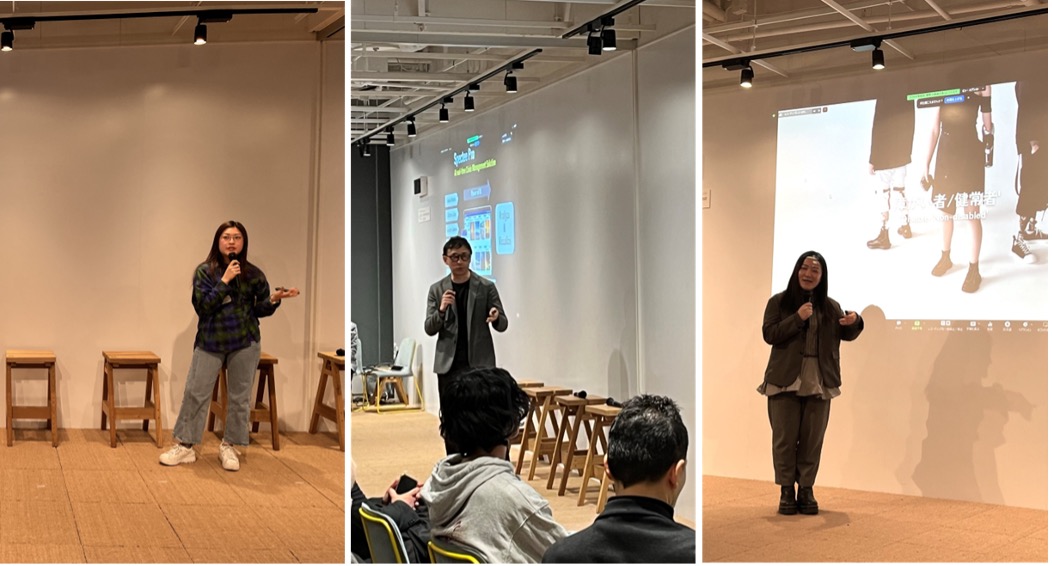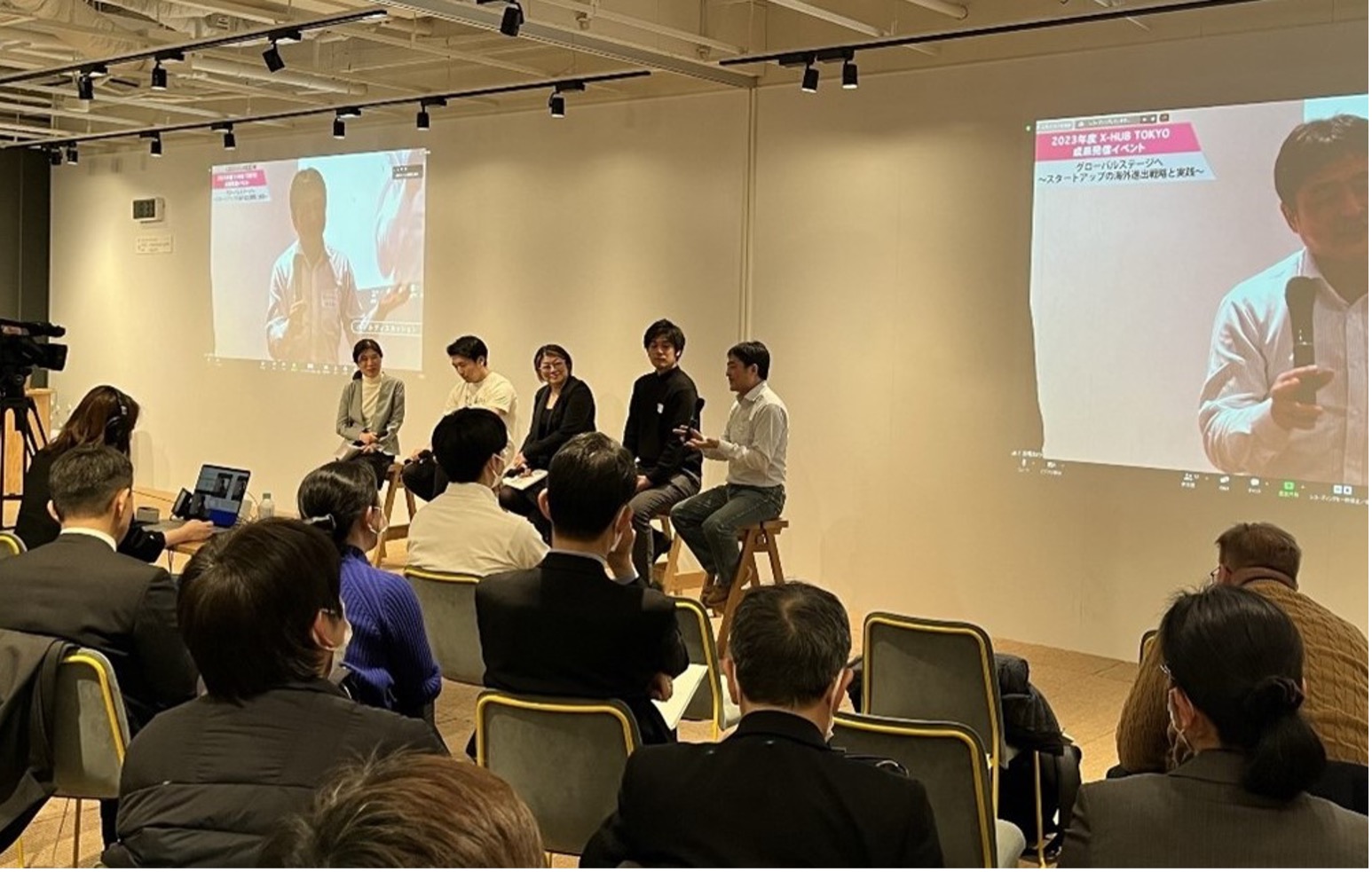On March 19, 2024, X-HUB TOKYO, which helps Tokyo startups expand overseas, held a wrap-up event titled “Going Global: Startups’ Overseas Expansion Strategies and Practices.”
In this wrap-up event, Prof. Akie Iriyama of Waseda Business School provided a keynote speech on the strategy of overseas expansion for startups under the title of “Management for Startups: New Common Sense of Global Strategy,” sharing how to draw up a strategy necessary for startups to expand overseas and key points to succeed internationally.
The presentation session then featured the startups that had participated in X-HUB’s three key programs; the “OUTBOUND PROGRAM,” an overseas expansion acceleration program for startups in Tokyo, the “INBOUND PROGRAM,” an acceleration program for overseas startups aiming to enter Tokyo, and the “SCRUM PROGRAM,” a support program for startups to acquire essential knowledge and skills necessary for overseas expansion. They shared their firsthand experiences with overseas expansion, highlighting the appeal of going global and, the benefits and outcomes of the X-HUB program.
The event concluded with a panel discussion by the representative startups that had participated in the key programs. They shared their progress in overseas expansion, what impressed them most, and advice for startups aiming to expand overseas in the future.
Keynote Speech: Management for Startups ― New Common Sense of Global Strategy

- First, we would like to ask Prof. Iriyama Akie, Waseda University, Graduate School of Business and Finance, Waseda Business School, about the importance of Japanese startups expanding overseas.
-
My area of expertise lies in corporate strategy and global management. I have experienced working with executives and investors of various startups, providing advice and other supports. Looking at past trends, Japanese companies often focused on their home market first before venturing overseas. As a result, it took a long time, 20 to 30 years, before going global.
But today, with globalization and the widespread of ““business protocols”“ such as English and programming languages, companies can start thinking about international expansion much earlier. In fact, it’s becoming increasingly important to do so from the very beginning.
The reason for this is clear when we look at the rankings of the world’s biggest companies. While seven Japanese companies, including NTT, were ranked in the top 10 by market capitalization, there wasn’t a single Japanese company ranked in 2023. The difference lies in the size of TAM (Total Available Market: the overall market size that a business can potentially capture). The Japanese companies that ranked in 1989 primarily focused on the market in Japan, which is experiencing a low birthrate and ageing population. Understanding where these companies are targeting as their TAMs today can help make sense of the rankings.
On the other hand, many countries and regions, including Asia and Africa, have booming populations. With a larger population comes the potential for significant market growth, leading to greater business opportunities. If you want to truly grow your business, aiming for fast international expansion or being a Born Global Firm is a must.
- Thank you. Next, what points should Japanese startups have when expanding overseas?
-
Broadly speaking, there are four points. The first point is to have a global mindset. Whether you have a global mindset or not will impact the members and investors that come together. The second point is to look at the market acceptance of the product or service, namely, PMF (product market fit). Let’s look at the market on a global scale, not a domestic level. Market needs and preferences can vary greatly depending on the country and region, so it is important to clarify your product’s characteristics.
The third point is securing the right investors. The presence of investors who genuinely sympathize with your philosophy and business activities and aim for the world together will greatly support your overseas expansion. The fourth and final point is building a team that can focus on overseas expansion. One way is to have members of foreign nationalities join the company from the beginning, and to create a global management team. I have seen many Japanese companies struggling with overseas expansion due to a lack of skilled international talent. Therefore, I recommend recruiting and training right persons from the early stage of overseas expansion. By doing so, a global culture will gradually be fostered within the company, and a cycle in which new people are attracted to this culture will further strengthen your global capabilities. So, it is important to verbalize the organizational culture properly. Taking the time to talk with various team members and putting each vision, direction and culture into words will surely lead to future actions.
I encourage you to take a step toward becoming a Born Global Firm. I really support your challenge!
Presentation on Benefits and outcomes of X-HUB
-
Following the keynote speech, the startups that participated in the 2023 SCRUM, OUTBOUND, and INBOUND PROGRAMs reported benefits and outcomes.
The SCRUM PROGRAM has provided support for Tokyo-based startups aiming to expand overseas by acquiring marketing knowledge necessary for overseas expansion and verifying their business hypotheses, and opportunities to pitch to foreign VCs. The Program also offered networking opportunities with international startups and VCs.

-
Yuji Mikami, CEO of ikigai, an AI counseling service specializing in personality assessment and psychological analysis, mentioned, “we could identify the target market and develop expansion strategy. We also received advice that led to concrete actions on how to proceed in the US, where we are considering an expanding in the future.”
Moeko Takagi, Global Partnership Manager of Digiriha, which develops digital rehabilitation tools remarked “After having interviews and trials at hospitals and other institutions in India during the program period, we decided to launch a pilot trial there in spring of 2024. We are very grateful for the X-HUB program, which enabled us to take the first step in overseas expansion.”
Next, the event featured presentations by three startups that participated in OUTBOUND PROGRAM. This program is specifically designed to support Tokyo-based startups in their efforts to expand internationally.

-
Alyssa Yamashita, Business Manager at PEEL Lab, which produces leather from pineapple skin, shared their experience with the X-HUB program. “It helped us understand that each European country has different market characteristics. Discussions with local companies also sparked ideas for new product development.”
Satoshi Negoro, COO of Spectee, which provides AI disaster prevention and crisis management solutions, highlighted the benefits of participating in the Manila course. “We joined the Program because we planned to launch the service in the Philippines in 2024. We were able to negotiate with potential distributors and discuss potential investment opportunities. We would like to expand our services throughout ASEAN and Asia with a successful foundation in the Philippines.”
SOLIT, a company promoting diversity and inclusion inspired by Eastern philosophies, participated in the London course. Misaki Tanaka, CEO/Founder, shared their success story. “We had discussions with several universities in London. In particular, we secured collaboration with the University of Westminster to set up a laboratory. Also, we were appointed as a counterpart to assist some British companies in expanding to Asia.”
Finally, two companies participated in “INBOUND PROGRAM,” which facilitates interaction between overseas startups and companies and startups in Tokyo online.

-
Electriq, an Israel-based startup that develops powdered hydrogen to store and transport at room temperature without the need for pressurized conditions, participated in the Clean Tech course. “We were looking to build relationships with Japanese fuel cell manufacturers, powder factory partners, and potential investors, with the aim of expanding our powder manufacturing capabilities. Thanks to the Program, we have made significant progress in initiating discussions and moving forward, “ said Danny Weber, VP Business Development.
Lastly, Torsten Scholl, Co-founder/CEO of Aitonomi, a Germany-based company focuses on automating and electrifying industrial and urban logistics through autonomous transport robots, shared his experiences. “We could meet a variety of automotive partners. As a result, we are now planning to establish an R&D facility in Japan. We will be opening an office in Japan and are eager to meet with interested parties in Japan.”
Panel discussion by program participants

-
Finally, a panel discussion was held among the representative companies of OUTBOUND PROGRAM and SCRUM PROGRAM.
The panelists for the discussion included Nakata Tomofumi, Co-Founder & CEO of Clay Technologies, Shiraogawa Ako, Managing Director and Chief Alliance Officer of STYLY, and Hashizume Hiroya, Founder & CEO of Kinish, all of whom participated in OUTBOUND PROGRAM. Sakamoto Yoshihiro, President of Tokyo Robotics, who participated in SCRUM PROGRAM, was also present. The panel was moderated by the X-HUB Tokyo Administrative Office.
- First of all, please introduce yourself and explain why your company is aiming to expand internationally, as well as any progress you have made so far.
-
Nakata Tomofumi (Hereinafter Nakata): Nice to meet you. I am Nakata, representing Clay Technologies. Our company specializes in developing and providing tools that utilize generative AI to qualitatively analyze consumer needs. Currently, we mainly provide services to manufacturers of consumer products. Through the X-HUB New York course, we were able to connect with lawyers in the US as we explore a possibility of expanding into the country. We recognize the US as a market with tremendous potential. To facilitate our expansion plans, we have decided to establish a local base in the US. By around May 2024, I will personally relocate there and commence full-fledged business operations.
Shiraogawa Ako (Hereinafter Shiraogawa): Hello. I am Shiraogawa from STYLY, a startup that develops and deploys virtual reality (VR), augmented reality (AR), and mixed reality (MR) content creation and distribution tools to enrich virtual spaces. We have been dedicated to expanding our reach globally since our inception. Currently, we have 90,000 creators from 39 countries utilizing our platform to develop contents. As part of our efforts to solidify our success abroad, we recently participated in the Singapore course of X-HUB program. Joining this program was an important step for us as it allowed us to gather valuable information and streamline our strategies as we looked building a significant track record in the international market.
Hashizume Hiroya (Hereinafter Hashizume): I am Hashizume from Kinish. Our company is at the forefront of biotechnology in the development of alternative foods, focusing on creating ice cream made from rice milk. As part of our long-term strategy, we have set our sights on expanding into the US by 2027. So, we joined the Silicon Valley course this time. The US, particularly California, has caught our attention due to its market potential and favorable regulations in the food tech industry. We are actively working on developing our business.
Sakamoto Yoshihiro (Hereinafter Sakamoto): I’m Sakamoto from Tokyo Robotics. We are a company dedicated to developing and commercializing research robots, and robots specialized in logistics and data center solutions. Currently, our main focus is on providing solutions to shoe retailers. We have joined SCRUM PROGRAM, which has opened up opportunities for us to explore potential expansion into the US. In our case, we did not think about overseas expansion at all when we initially started our business. However, as we delved deeper into the development potential of our logistics business, particularly in the US, we realized the immense possibilities and decided to pursue this program.
- What are your thoughts on completing the program, and what are your messages for startups considering applying in the future?
-
Nakata: Throughout the Program, we had the opportunity to engage with numerous VCs and immerse ourselves in the local startup community. It became evident that the investment landscape abroad presented higher hurdles than in Japan. Additionally, I was impressed by the proactive nature of local entrepreneurs in reaching out to investors and VCs. This experience reaffirmed my belief that I must be prepared to surpass their efforts to succeed in the business. For those considering expanding their business overseas, I strongly recommend going to the target market firsthand. It may come with challenges and obstacles, but that’s where the real journey begins.
Shiraogawa: In Singapore, we were able to brush up our business while bouncing ideas off of various people. We also had opportunities to meet numerous investors at fintech exhibitions. Additionally, it allowed us to validate the applicability of our Japanese use cases in an international setting. Overall, it was an incredibly meaningful experience. We highly recommend entrepreneurs prioritize visiting the target location as it can bring valuable insights and opportunities that may not be apparent from a distance. Moving forward, we will channel the experiences and lessons learned into working out the details of our business strategy.
Hashizume: Our decision to join the Program was driven by our aspiration to be part of the renowned Silicon Valley ecosystem and establish connections with local VCs. Recognizing Silicon Valley as the mecca for food tech, where many food tech businesses have originated, we were eager to “test our abilities” and assess the viability of our ideas within this dynamic environment. Throughout the Program, we had the privilege of pitching our ideas more than 30 times who posed thought-provoking questions and challenges. This experience was both exhilarating and enlightening, as it pushed us to refine our perspectives and hone our pitches. The program as a whole was an exciting journey that broadened our horizons and allowed us to see our ideas from new angles. If you are planning to expand overseas in the future, we strongly recommend taking a proactive step of visiting the target market and considering participation in a program as an initial step.
Sakamoto: Participating in SCRUM PROGRAM allowed us to significantly increase the resolution and clarity of our overseas expansion plans. Furthermore, when I shared the insights and information I gained from the Program with other executives within the company, it gradually changed our collective mindset, leading us to approach international expansion more seriously. It was a remarkable achievement to be able to develop a detailed strategy rather than treating it as a vague concept of “overseas expansion.” The opportunity provided by the X-HUB program was instrumental in collecting and analyzing the essential information required for successful overseas expansion. Based on our experience, we highly recommend participating in the X-HUB program for the purpose of collecting information necessary for overseas expansion.
- At the event, X-HUB TOKYO provided information on how startups aiming to expand overseas should draw up and implement strategies, referring to various examples. X-HUB TOKYO will continue to provide the latest information on the know-how required for overseas expansion, the latest trends in open innovation in Japan and overseas, and the characteristics and attractiveness of the overseas startup ecosystem.

